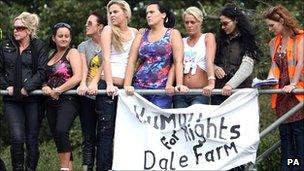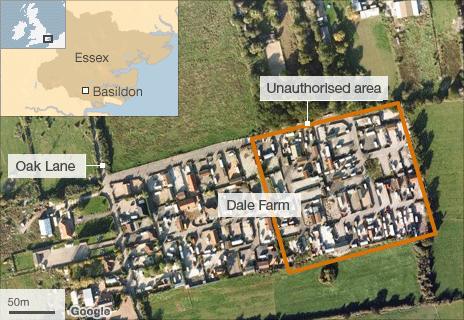Dale Farm traveller site: Bailiffs urge end to obstruction
- Published
Fergal Keane: "Two young activists have concreted themselves in"
Bailiffs have arrived at the UK's largest illegal traveller site at Dale Farm in Essex and urged campaigners to stop obstructing the eviction process.
About 20 men in blue jackets marked "Enforcement Officer" then moved away from the site.
A spokesman for the bailiffs said he was concerned a structure erected by the campaigners had the potential to "put people's lives in danger".
As many as 400 people have been living on the 51 unauthorised caravan plots.
Councillor Tony Ball: "I would much rather we reached a peaceful solution"
Meanwhile in London, 72-year-old traveller Mary Flynn, who suffers breathing problems, lost her last ditch appeal court bid to challenge her eviction from Dale Farm.
At Dale Farm, Bryan Lecoche, of council-employed bailiffs Constant and Co, warned travellers and protesters there was "legal judgement which allows Basildon Council to restore this area of land back to green belt land".
He added: "There are major health and safety concerns. You have deliberately blocked the emergency access road.
"In addition I am concerned that the structure erected has the potential to put people's lives in danger."
Officials said 12 families had already left the site at Crays Hill and those remaining have built reinforcements at the six-acre site.
Basildon Council had hoped to persuade all residents to leave but accused some of stalling to delay the action until a planning hearing in late November.
Those remaining, including activists, erected a barrier but it was being taken down by council staff.
'Overwhelming support'
At an earlier news conference council officials said they believed talks with residents had been aimed at delaying the evictions until 22 November when the planning inspectorate is expected to rule on an application for pitches on land nearby.
Council leader Tony Ball said: "If they do not allow us in then we will begin action. Once it starts it will move swiftly and the site will be cleared even though it might take six to eight weeks."
Electricity would be turned off for the safety of the operatives who would go in to the site but Mr Ball would not give an exact time when the evictions will begin.
"My personal concern is over the introduction of outsiders who may have their own agenda and not have the interests of the travellers at heart," he said.
"I have also been told that these protesters on the site now outnumber the travellers."
He added: "The overwhelming number of callers to the council support our action and approach."
The cleared site would also be left so that it could not be re-entered, he said.
Essex Police said their presence at Dale Farm was intended to keep the peace and ensure anyone breaking the law was dealt with but no arrests had been made so far.
'Elderly and sick'
Supporters inside the site said they wanted Basildon Council to provide 62 plots to temporarily house those made homeless while planning permission was sought for other sites.

Travellers and campaigners have been protesting from a platform at the site
The council said it had so far received 56 homelessness applications.
The Liberal Democrat chairman of the All Party Parliamentary group for Gypsy Roma travellers, Andrew George, said he had hoped the dispute could be resolved through negotiation.
But he said he was also aware the traveller issue was a national one as there were not enough legal sites for them to go to.
Travellers inside Dale Farm reacted angrily to claims that only activists remain inside the perimeter.
Resident Kathleen McCarthy said: "The elderly and sick are here and we will stay. That bluff won't work with us."
At the High Court on Monday afternoon Mrs Flynn's appeal was rejected by Lord Justice Pill.
Her counsel, Stephen Cottle, said she was "too frail" to be evicted, and "dispossessing" her of her land would be "disproportionate" under human rights laws.
But Lord Justice Pill dismissed Mrs Flynn's application for permission to appeal against a High Court judge's refusal last month to grant a temporary injunction to halt or delay the evictions.
'To be avoided'
Jan Jarab, the European representative of the United Nations High Commissioner for Human Rights, said he had made an offer to the British government to help with negotiations, citing his experience in similar situations elsewhere in Europe.
Mr Jarab was "informally told that wouldn't happen", he said.
"Obviously the forced eviction of hundreds of people including women and children is something to be avoided if there are alternatives," he said.
BBC correspondent Fergal Keane, who is inside the illegal part of the site, said: "There is now about an equal split between travellers and supporters. The travellers are certainly grateful for the support of the activists."
It is thought many of the residents have moved to the legal area which is not subject to the eviction order.
Dale Farm is a former scrapyard that was bought by several traveller families who moved on to the site a decade ago.
Within a year other families had bought patches of land and moved their caravans there but it has been the council's case that this part of the site is greenbelt land.
These moves were brought to the attention of local council planners who applied for the people to be moved which sparked a long legal battle at the same time as more travellers arrived to make their homes on the site.
Travellers upgraded their homes by replacing caravans with chalets and other semi-permanent structures.
The legal battle ended when Basildon Council was given authority to begin evictions earlier this year.

Part of the Dale Farm site is at the centre of the dispute
- Published16 September 2011
- Published15 September 2011
- Published13 September 2011
- Published4 July 2011